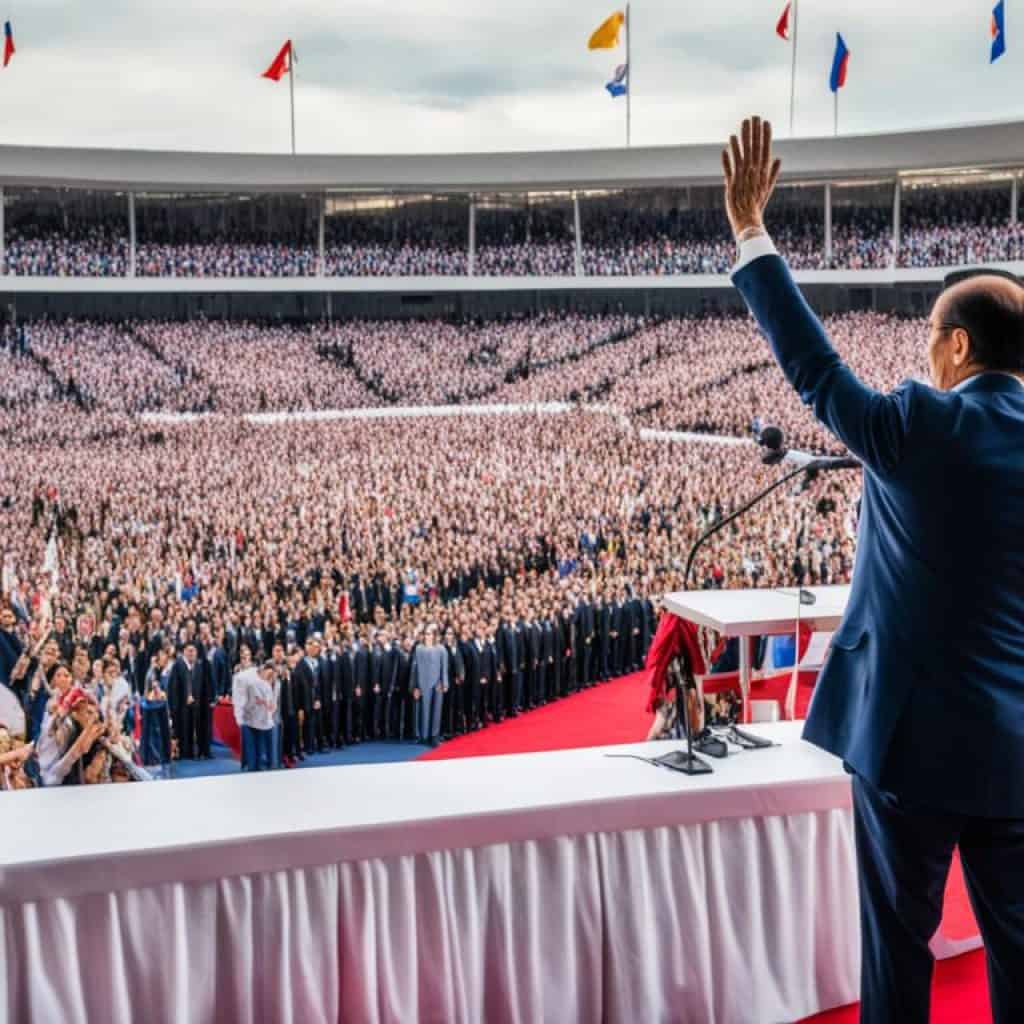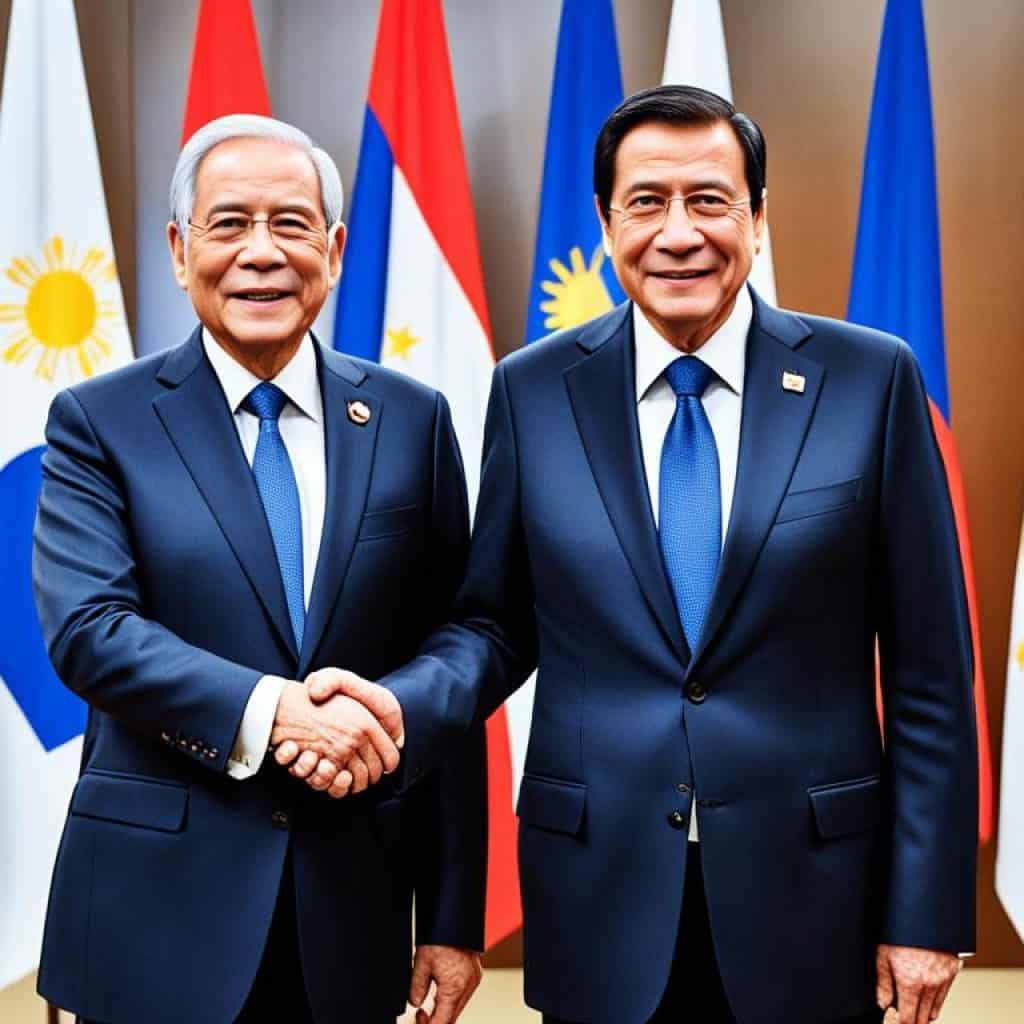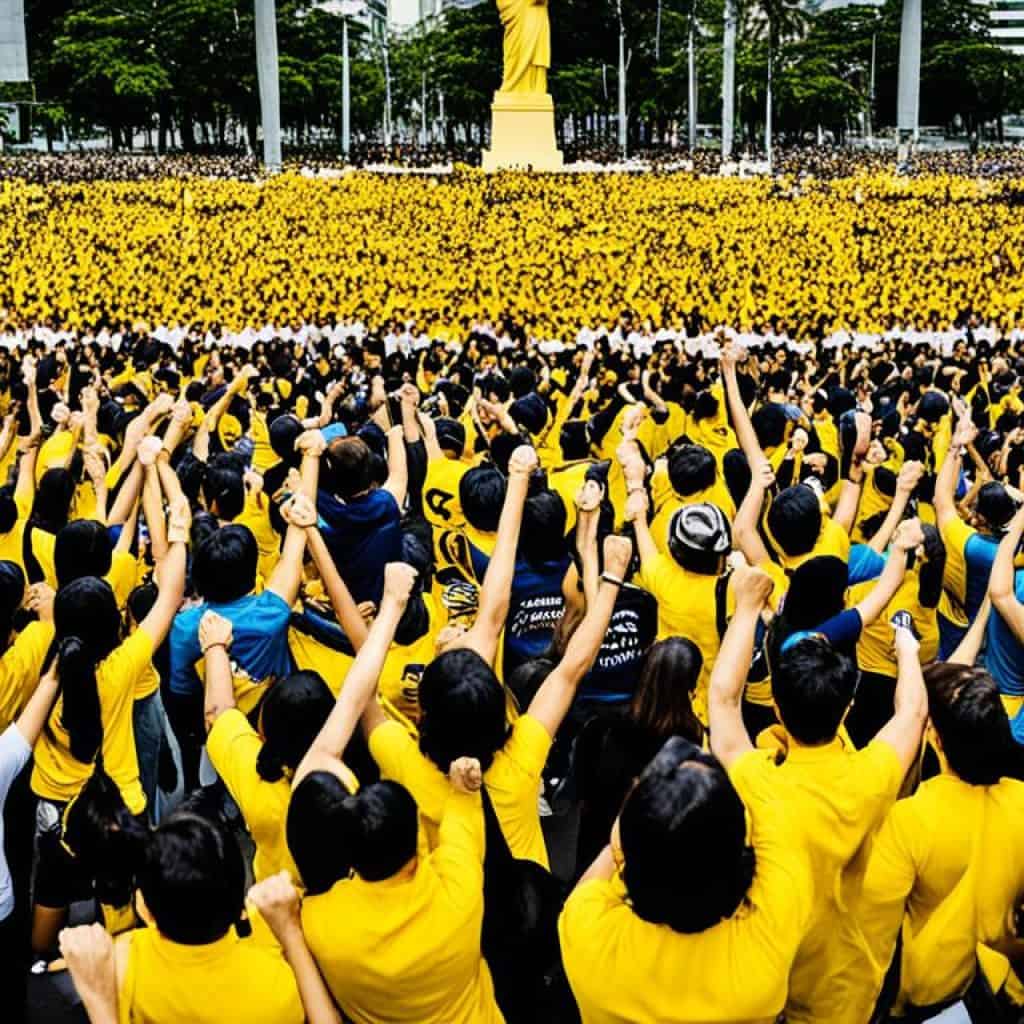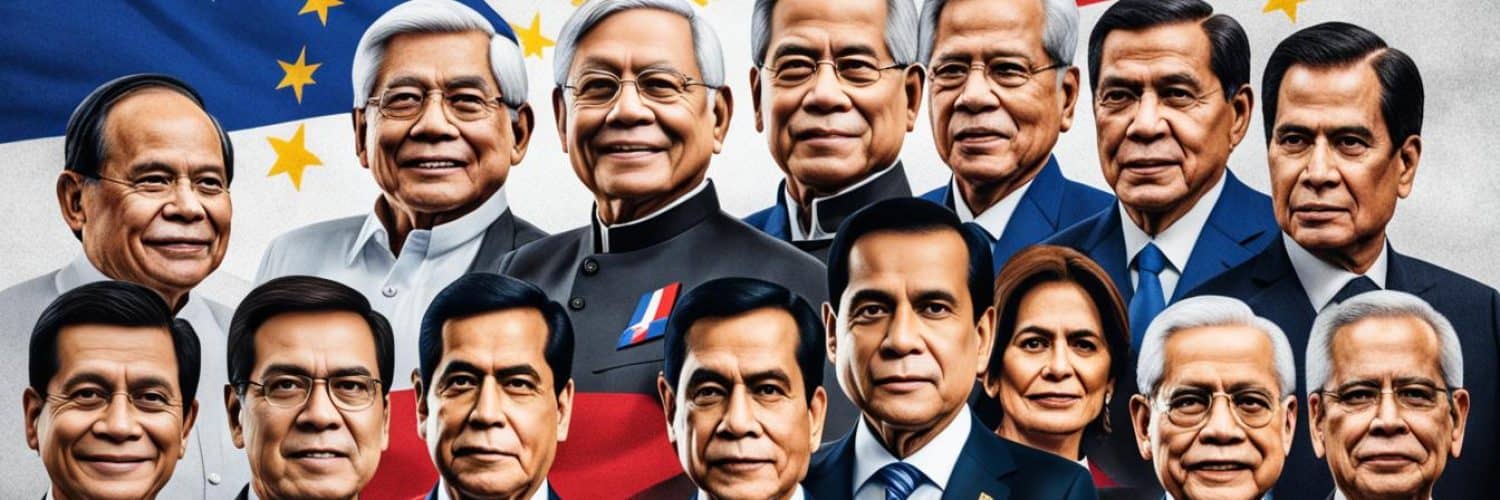As the 17th President of the Philippines is revealed, the nation eagerly waits to discover who will lead them forward. With a rich history of leaders who have shaped the country’s destiny, this new era brings anticipation and uncertainty. Will the new President bring about much-needed change and unity, or will they face the challenges of the past? In this article, we delve into the identity of the 17th President of the Philippines and explore the implications of their leadership.
Key Takeaways:
- The 17th President of the Philippines has been revealed.
- Historical revisionism and disinformation played a role in their victory.
- The Marcos family has returned to power after 36 years.
- Controversies surrounding the 17th President’s election and the family’s history.
- The challenges, promises, and policy agenda of the new President.
The Marcos Family’s Return to Power
With the election of Ferdinand “Bongbong” Marcos Jr. as the 17th president of the Philippines, the Marcos family has made a significant comeback after 36 years. This marks a return to power for the family, following the rule of Ferdinand Marcos Sr., the former dictator who held power for 21 years.
Since the death of Marcos Sr. in 1989, the Marcos family has been working tirelessly to regain their influence and authority in the Philippines. Now, with the election of Marcos Jr., they have succeeded in their mission.
The Marcos regime, characterized by dictatorship, historical revisionism, and allegations of corruption, left a lasting impact on the country. During their rule, the Marcos family amassed significant wealth and faced accusations of human rights abuses.
“The Marcos regime was marked by a tight grip on power, fueled by historical revisionism and allegations of corruption.” – Expert
Despite the controversy surrounding their return, the Marcos family continues to hold sway in Philippine politics. The election of Marcos Jr. as president has sparked debates about the potential consequences of his presidency and the implications for the nation’s future.
As the Marcos family returns to power, concerns arise regarding the potential revival of past authoritarian practices and the impact on democracy and human rights in the country. The echoes of historical revisionism and allegations of corruption remain fresh in the minds of many Filipinos.
| Key Points | Details |
|---|---|
| Return to Power | After 36 years, the Marcos family is back in a position of authority and influence. |
| Marcos Sr.’s Rule | Ferdinand Marcos Sr. served as the dictator for 21 years until ousted through a people’s uprising. |
| Characteristics of the Marcos Regime | Dictatorship, historical revisionism, and allegations of corruption defined the Marcos family’s previous rule. |
As the Marcos family returns to power, the nation and the international community closely watch the developments and navigate the challenges that lie ahead.
Marcos Jr.’s Promises and Inaugural Speech
In his inaugural speech, President Bongbong Marcos promised to bring about changes that would benefit all Filipinos. He emphasized his commitment to national unity and promised to deliver on the responsibilities entrusted to him by the people. Marcos also praised his father’s accomplishments but stated that he was not there to dwell on the past. Instead, he focused on the future and the potential for progress and development in the country.

Controversies Surrounding Marcos Jr.’s Presidency
The election of Ferdinand Marcos Jr. as president has sparked controversy due to the Marcos family’s history of corruption and human rights abuses during their time in power. Critics express concerns that the family may exploit their newfound power to access hidden wealth and perpetuate another era of brutality. Activists and human rights organizations demand that Marcos Jr. acknowledge and atone for the human rights violations committed during his father’s regime. Furthermore, there are allegations of historical revisionism aimed at whitewashing the Marcos family’s actions.
“The people deserve a leader who is transparent and accountable for their actions. Marcos Jr. must confront the corruption and human rights abuses associated with his family’s name if he wishes to gain the trust and support of the Filipino people.” – Human Rights Organization Spokesperson
Fighting Corruption and Ensuring Transparency
One of the key concerns surrounding Marcos Jr.’s presidency is the potential for corruption. The Marcos family’s past has been marred by allegations of embezzlement and misuse of public funds. As president, Marcos Jr. must prioritize fighting corruption and ensuring transparency in governance to address these concerns. By implementing robust anti-corruption measures and holding individuals accountable for their actions, he can instill confidence in the government and rebuild public trust.
Upholding Human Rights and Justice
The human rights abuses that occurred during the Marcos regime remain a sensitive and contentious issue. It is essential for Marcos Jr. to acknowledge the atrocities committed, offer sincere apologies, and provide reparations to the victims and their families. By promoting human rights and justice, Marcos Jr. can demonstrate a commitment to upholding the dignity and well-being of all Filipinos, fostering unity and healing in the nation.
Preserving Historical Truth
Historical revisionism is a significant concern surrounding the Marcos family’s return to power. Accusations have been made that attempts are being made to distort or downplay the darker aspects of the Marcos regime. It is crucial for Marcos Jr. to ensure that an accurate and unbiased portrayal of history is preserved. By promoting historical truth, he can contribute to a society that learns from past mistakes, values transparency, and fosters a culture of open dialogue and exchange of ideas.
Marcos Jr.’s Background and Political Career
Ferdinand Marcos Jr., commonly known as Bongbong, has dedicated his life to public service. He comes from a political family, with his father Ferdinand Marcos Sr. serving as the 10th president of the Philippines. Bongbong has held various positions in government, including governor of Ilocos Norte, congressman, and senator. Throughout his career, he has focused on issues such as agriculture, renewable energy, and support for overseas Filipino workers.
Starting his political career as the governor of Ilocos Norte, Bongbong Marcos gained valuable experience in local government administration. He focused on implementing programs that aimed to improve the lives of the people in his province. During his tenure as governor, Marcos Jr. implemented agricultural reforms, promoted renewable energy initiatives, and established mechanisms to support overseas Filipino workers.
Following his successful tenure as governor, Marcos Jr. transitioned to the national political stage. He was elected as a congressman, representing the second district of Ilocos Norte. As a congressman, he championed legislation that aimed to boost agricultural productivity and support the welfare of Filipino farmers. Marcos Jr. also played a key role in advocating for renewable energy development in the country, recognizing its potential to address environmental concerns and contribute to energy sustainability.
Building on his experience and achievements as a congressman, Bongbong Marcos ran for the position of senator and emerged victorious in the elections. As a senator, he continued to focus on issues close to his heart, such as agriculture and renewable energy. Marcos Jr. consistently advocated for policies and initiatives that aimed to foster economic growth and improve the well-being of the Filipino people.
Throughout his political career, Ferdinand “Bongbong” Marcos Jr. has demonstrated a strong commitment to public service and a passion for addressing the needs of the Filipino people. His experience as a governor, congressman, and senator has provided him with valuable insights and expertise in governance and policymaking. With a focus on agriculture, renewable energy, and overseas Filipino workers, Marcos Jr. has consistently worked towards creating a better future for the Philippines.
Marcos Jr.’s Vision for the Philippines
During his campaign, Bongbong Marcos presented a compelling vision for the future of the Philippines. Central to his vision is the idea of unity, bringing together the Filipino people in a shared purpose. Marcos believes that by working together, the country can achieve progress and development on multiple fronts.
“I envision a Philippines where every citizen is united in our pursuit of a better tomorrow,” Marcos stated passionately during his campaign rallies. He emphasized the need for collaboration and a participatory society, where every Filipino has a voice in shaping the nation’s trajectory.
“Unity is the foundation upon which progress and development are built. By fostering a sense of togetherness, we can overcome challenges and transform the Philippines into a nation of opportunity and prosperity,” Marcos declared.
To realize his vision, Marcos intends to prioritize growth and prioritize the welfare of the Filipino people. His focus is on advancing the country’s economic prosperity, creating more jobs, and improving the living standards of all Filipinos. Marcos believes that through innovation, sustainable development, and investment in key sectors, the Philippines can become a global leader.
Key Pillars of Marcos Jr.’s Vision
Marcos Jr.’s vision for the Philippines revolves around four key pillars:
- Unity: Marcos aims to bridge the gaps among different sectors of society, fostering a culture of inclusivity and collaboration. He believes that by working together, the Filipino people can overcome any obstacle and set the nation on a path of progress.
- Progress: Marcos envisions a future where the Philippines becomes a hub of innovation and economic growth. He plans to implement policies that attract national and international investments, create more job opportunities, and drive sustainable development across various industries.
- Development: Marcos is committed to developing the Philippines into a more advanced and prosperous nation. His focus includes improving infrastructure, healthcare, education, and social services to enhance the overall quality of life for all Filipinos.
- International Engagement: Marcos seeks to strengthen the country’s position on the global stage through strategic foreign relations and increased trade partnerships. He believes that by fostering mutually beneficial relationships with other nations, the Philippines can further enhance its economic and social development.
The vision put forth by Bongbong Marcos for the Philippines is one of hope and progress. With a focus on unity, growth, and development, Marcos strives to lead the country into a future characterized by prosperity and opportunity for all.
Marcos Jr.’s Policy Agenda
President Bongbong Marcos is dedicated to implementing a comprehensive policy agenda that aims to foster national unity, drive economic growth, and attract foreign investment. His policies prioritize the well-being of the Filipino people and promote a more inclusive and prosperous society.
Promoting National Unity
Marcos Jr. recognizes the importance of unity in moving the country forward. His policy agenda includes initiatives and programs that bring Filipinos together, regardless of their differences. By fostering a sense of shared purpose and collective responsibility, Marcos Jr. aims to build a stronger and more harmonious nation.
Driving Economic Growth
A key focus of Marcos Jr.’s policy agenda is to stimulate economic growth in the Philippines. He plans to achieve this through various means, such as promoting foreign investment, supporting local entrepreneurs, and enhancing infrastructure development. By encouraging both local and international businesses to invest in the country, Marcos Jr. aims to create more job opportunities and spur economic prosperity.
Supporting Local Farmers
Marcos Jr. understands the significance of agriculture in the Philippine economy. His policy agenda includes comprehensive support for local farmers and agricultural communities. Marcos Jr. aims to implement initiatives that enhance agricultural productivity, provide farmers with access to modern technology and sustainable farming practices, and improve market opportunities for their produce.
Promoting Sustainable Development and Renewable Energy
With a focus on environmental sustainability, Marcos Jr. is committed to promoting sustainable development and renewable energy sources. His policy agenda includes the development of clean energy projects, the implementation of eco-friendly practices, and the preservation of natural resources. By investing in renewable energy, Marcos Jr. aims to reduce the country’s carbon footprint and pave the way for a more sustainable future.
Advocating for Overseas Filipino Workers
Marcos Jr. recognizes the significant contribution of overseas Filipino workers (OFWs) to the country’s economy. His policy agenda includes measures to safeguard the rights and welfare of OFWs, such as providing financial assistance, offering skills training programs, and improving support services. Marcos Jr. aims to empower OFWs and their families, ensuring that they have access to opportunities and resources for a better future.
Promoting Local Government Reform
Another key aspect of Marcos Jr.’s policy agenda is advocating for greater local government reform. He aims to enhance the efficiency and effectiveness of local governance, promote transparency, and empower local communities. By strengthening local government institutions, Marcos Jr. seeks to ensure that decision-making is inclusive, participatory, and responsive to the needs of the people.
| Policy Agenda | Key Objectives |
|---|---|
| Promoting National Unity | Bring Filipinos together, foster a sense of shared purpose and responsibility |
| Driving Economic Growth | Promote foreign investment, support local businesses, enhance infrastructure development |
| Supporting Local Farmers | Enhance agricultural productivity, provide modern technology and sustainable farming practices |
| Promoting Sustainable Development and Renewable Energy | Develop clean energy projects, implement eco-friendly practices, preserve natural resources |
| Advocating for Overseas Filipino Workers | Protect rights and welfare, offer financial assistance, provide skills training programs |
| Promoting Local Government Reform | Enhance efficiency and transparency, empower local communities |
Marcos Jr.’s Leadership Style and Cabinet
President Bongbong Marcos is widely recognized for his systematic and efficient leadership style. He understands the importance of a well-structured and organized approach to governance, and his leadership style reflects these principles.
One of the key aspects of Marcos Jr.’s leadership style is his emphasis on valuing the input of his Cabinet members. He believes in surrounding himself with a diverse group of individuals who bring different perspectives and expertise to the table. By consulting with experts from various fields, Marcos ensures that his decision-making process is well-informed and takes into consideration a wide range of viewpoints.
“I firmly believe that effective leadership is not an individual effort, but a collective one,” Marcos has stated on multiple occasions. “My Cabinet members play a crucial role in shaping policies, implementing reforms, and achieving our shared vision for the Philippines.”
With this collaborative approach, Marcos Jr. aims to build a strong team that can effectively implement his policies and bring about positive changes in the country. His cabinet appointments have consistently demonstrated his commitment to selecting individuals with experience, expertise, and a proven track record in their respective fields.
Marcos Jr.’s decision-making process also focuses on efficiency. He values the importance of timely and well-informed decisions, ensuring that the government’s response to various issues is swift and effective. By prioritizing efficiency, Marcos aims to maximize the impact of his policies and initiatives, ultimately benefiting the Filipino people.
To summarize, President Bongbong Marcos’s leadership style is systematic, efficient, and collaborative. By valuing the input of his Cabinet members, consulting with experts, and prioritizing efficiency, Marcos Jr. is laying the foundation for a successful and transformative presidency.
Major Acts and Legislation under Marcos Jr.’s Presidency
President Bongbong Marcos has been actively involved in enacting major acts and legislation to drive progress and address key national issues. The following table provides an overview of some of the significant laws signed during his presidency:
| Legislation | Focus Area | National Scope |
|---|---|---|
| Clean Energy Act | Promoting renewable energy sources and reducing carbon emissions | Nationwide |
| Educational Reform Act | Revamping the education system to enhance quality and accessibility | Across all regions |
| National Security Enhancement Act | Strengthening security measures to protect the nation from threats | Countrywide |
| Economic Development Act | Promoting sustainable economic growth and job creation | Applicable nationwide |
These major acts and legislation showcase President Bongbong Marcos’s commitment to addressing crucial issues such as clean energy, education, national security, and economic development on a national scale. By focusing on these areas, Marcos aims to build a better future for all Filipinos.
“Through the enactment of these laws, we are taking significant steps towards a more sustainable, prosperous, and secure Philippines. Our vision for the nation is one of progress, unity, and development.”
International Trips and Foreign Relations
President Bongbong Marcos recognizes the importance of establishing strong foreign relations and attracting foreign investment for the growth and development of the Philippines. To achieve these goals, he has embarked on international trips aimed at promoting the country’s potential and forging partnerships with other nations. These trips serve as opportunities to showcase the Philippines as an attractive investment destination and position it as a key player in the global economy.
During President Marcos’ international visits, he engages with foreign leaders, investors, and business representatives to discuss potential collaborations and highlight the advantages of investing in the Philippines. By showcasing the country’s economic potential, skilled workforce, and strategic location, Marcos aims to attract foreign direct investment that can contribute to job creation, infrastructure development, and overall economic growth.
More than just focusing on economic matters, these international trips also serve as platforms for diplomatic engagement. President Marcos seeks to strengthen the Philippines’ foreign relations and foster mutually beneficial relationships with other nations. Through dialogue, cooperation, and cultural exchanges, he aims to address regional and global challenges, promote peace and security, and enhance the country’s standing on the international stage.
President Bongbong Marcos recognizes that foreign investment and strong international relationships are vital for achieving his vision of unity, progress, and development for the Philippines. By actively engaging with the global community, he seeks to create a conducive environment for economic growth, technological advancements, and social development. These international trips are crucial in showcasing the Philippines’ potential and opening doors for collaboration and mutual understanding.

| Date | Destination | Purpose |
|---|---|---|
| April 2023 | Japan | Strengthen diplomatic ties and explore investment opportunities in technology and infrastructure. |
| July 2023 | United States | Meet with key stakeholders in the business and financial sectors to attract investment in various industries. |
| October 2023 | China | Discuss trade partnerships, infrastructure development, and cultural exchanges between the Philippines and China. |
| January 2024 | Australia | Explore opportunities for collaboration in renewable energy, tourism, and education. |
Challenges and Criticisms
President Bongbong Marcos faces a range of challenges and criticisms during his presidency. Some of the key concerns include:
- Rising inflation: There is growing unease about the increasing cost of living, which puts a strain on Filipino households.
- Joblessness: Dissatisfaction arises from the high unemployment rate, as many Filipinos struggle to find stable employment.
- Lack of productivity: Criticisms have been raised regarding the perceived lack of progress in addressing economic issues and delivering on campaign promises.
These challenges contribute to a sense of dissatisfaction among some Filipinos, as they experience economic hardships and a sense of insecurity. They expect the administration to take swift action to alleviate these concerns.
Critics also question the legitimacy of Marcos Jr.’s presidency, given the controversial history of the Marcos family. They emphasize the need for accountability regarding the actions of the Marcos family during the dictatorship, including allegations of corruption and human rights abuses.
It is essential for President Marcos to address these challenges and criticisms effectively, taking measures to address economic concerns and restore public confidence. Open and transparent governance can play a crucial role in addressing these issues and fostering trust among the Filipino population.
“The true test of leadership lies in facing challenges head-on and addressing the concerns of the people.” – President Bongbong Marcos
| Challenges and Criticisms | Impact |
|---|---|
| Rising inflation | Higher cost of living, financial strain on households |
| Joblessness | Unemployment, limited income opportunities |
| Lack of productivity | Slow progress in addressing economic issues |
| Legitimacy concerns | Doubts regarding Marcos Jr.’s presidency, accountability for past actions |
Public Perception and Protests
The public perception of Bongbong Marcos’s presidency is divided. While some Filipinos support his leadership and believe in his vision for the country, opposition and protests against his administration have also emerged. Critics are concerned about the historical distortion surrounding the Marcos regime and the unexplained wealth of the Marcos family. Activists and human rights organizations continue to advocate for justice and recognition of the human rights abuses committed during the dictatorship.
Supporters and Believers
There are Filipinos who stand behind Bongbong Marcos and see him as a capable leader. They are hopeful that his presidency will bring positive change and progress to the nation. These supporters believe in Marcos’s vision for a united and prosperous Philippines, and they trust his ability to deliver on his promises.
“President Marcos is the leader we need to move our country forward. His commitment to national unity and responsibility is admirable. I believe in his vision for a brighter future for all Filipinos.” – Jane Santos, a Marcos supporter.
Opposition and Protests
However, there is a significant opposition to Bongbong Marcos’s presidency, with demonstrations and protests taking place nationwide. Critics argue that the Marcos family’s history of corruption and human rights abuses during their time in power cannot be ignored. They are concerned that the return of the Marcos family to political prominence may lead to a disregard for democratic values and a repetition of past injustices.
“We cannot allow the historical distortion of the Marcos regime to go unchallenged. The human rights abuses and corruption must be acknowledged and addressed. We will continue to protest and fight for justice.” – Juan Dela Cruz, a human rights advocate.
The opposition movement consists of activists, human rights organizations, and individuals who believe that the presidency of Bongbong Marcos poses a threat to the democratic principles and progress achieved since the fall of the Marcos dictatorship. They call for accountability, transparency, and a commitment to human rights.
| Public Perception | Protests | Opposition |
|---|---|---|
| Divided | Ongoing nationwide | Critical of Marcos family history |
| Supporters and believers | Demonstrations for justice | Demand accountability and recognition of human rights abuses |
| Positive vision for the country | Voicing concerns about historical distortion | Advocacy for democratic values |
The public perception of Bongbong Marcos’s presidency remains contentious, reflecting a deeply divided nation. As the administration progresses, the role of protests, opposition, and public sentiment will continue to shape the political landscape of the Philippines.

Assessment of Marcos Jr.’s Presidency
As President Bongbong Marcos’s administration unfolds, it remains too early to provide a conclusive assessment of his presidency. The true measure of success lies in the progress made in addressing the challenges that confront the nation and the realization of his policy goals. Only in the years to come will a comprehensive understanding of Marcos Jr.’s leadership and its impact on the Philippines emerge.
Conclusion
The presidency of Bongbong Marcos in the Philippines holds significant importance for the nation. As the 17th president, he has the opportunity to shape the future of the country and lead it towards progress and development. However, his presidency is not without controversies and challenges that need to be addressed.
Throughout his campaign and inaugural speech, President Bongbong Marcos emphasized his commitment to national unity and his vision for a brighter future. He outlined a policy agenda focused on economic growth, foreign investment, and support for local farmers. Marcos also acknowledged the need for reforms in local government and prioritized the welfare of overseas Filipino workers.
However, critics are concerned about the Marcos family’s history of corruption and human rights abuses during their previous tenure in power. There are accusations of historical revisionism aimed at whitewashing their actions. The public perception of Marcos Jr.’s presidency is divided, with ongoing protests and opposition demanding justice and accountability.
Only time will tell the full impact and legacy of Bongbong Marcos’s leadership on the Philippines. The success of his administration will be measured by the progress made in addressing the country’s challenges and achieving his policy goals. As the journey unfolds, it is essential to navigate the path ahead with a balanced approach and encompass the diverse voices and needs of the Filipino people.


















Add comment